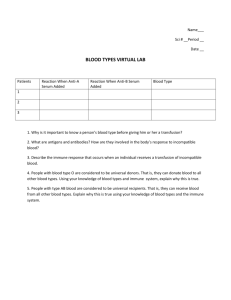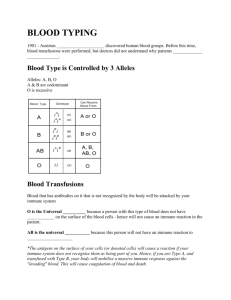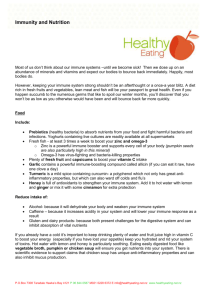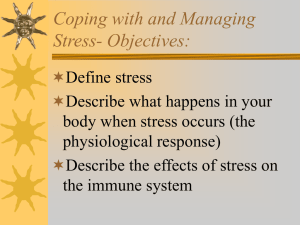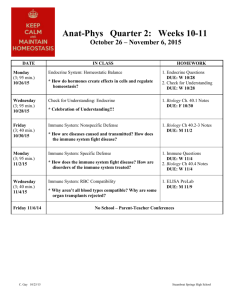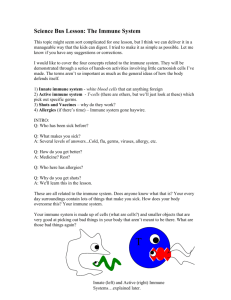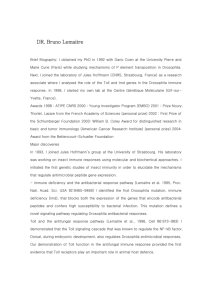Immune System Conditions - Job Accommodation Network
advertisement
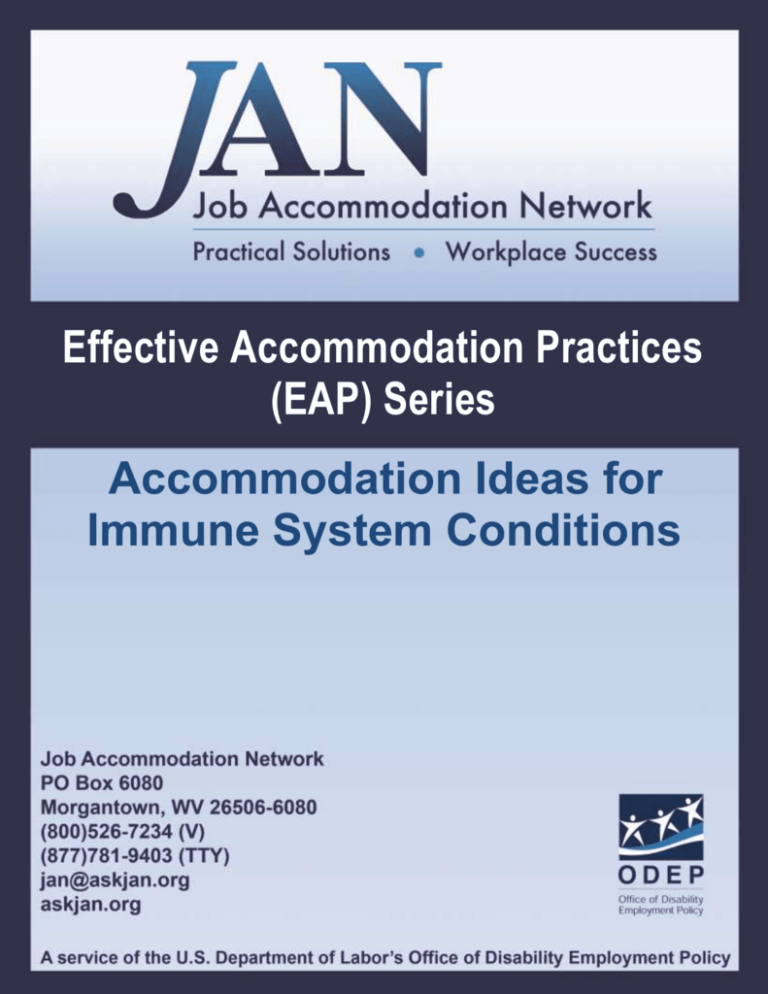
Effective Accommodation Practices (EAP) Series Accommodation Ideas for Immune System Conditions JAN’S EAP SERIES ACCOMMODATION IDEAS FOR IMMUNE SYSTEM CONDITIONS There are many individuals who have immune systems that function far differently than the norm. Some have overactive immune systems, while others have suppressed immune systems that do not function at the level of their peers. There are many different medical conditions that result in an underactive or overactive immune system. Several medications can trigger an immune response that can be temporary (e.g., during the use of the medication) or permanent (i.e., alter the immune system). Regardless of the cause, individuals who experience an overactive or underactive immune system may need accommodations to maintain or increase their productivity at work. The following is a quick overview of some of the job accommodations that might be useful. To discuss an accommodation situation with a consultant, contact JAN directly. Hygiene Issues: Provide hand sanitizer and antibacterial soap in all bathrooms and kitchens Provide proper hygiene trainings and reminders for all staff Attendance Issues: Provide flexible schedule to allow the employee to leave if being exposed to germs Provide flexible schedule/ telework when germ exposure is known ahead of time Enforce policy that sick employees and sick dependents of employees not come to the workplace Allow leave and flexible schedule for medical appointments and sick days Allow telework Allow temporary reassignment during flu season and otherwise as necessary Allow additional breaks to take medication, do treatments, and lower stress levels Stress Reduction: Reduce or eliminate physical exertion Have open-door policy to discuss workplace concerns with supervisor Provide leave time for use of EAP, therapeutic exercise programs, support group, or doctor’s appointments Allow for uninterrupted work time Allow self-paced workload Provide additional breaks Provide flexible schedule Work Environment: Provide a private work space away from others to minimize exposure to germs 2 Allow the employee to use his/her own equipment (phones, keyboards, tools, etc.) to minimize exposure to germs Provide equipment (printers, fax machines, copiers, heavy equipment) in the person’s workspace, for that person’s use only, to minimize exposure to germs Provide easily washable equipment (washable/sterilizable keyboard, mouse, etc.) Use HEPA filters in building heating and air-conditioning systems and do frequent cleaning and maintenance Provide good ventilation Provide air-purification systems (appropriate for the size space) and ionizers (appropriate for the size space) and personal, body-worn air-purification systems Allow mini fridge and freezer in the employee’s workspace for food and medication separate from others Provide regular cleaning of work environment including dusting, washing, and vacuuming of hard surfaces Exposure to Irritants: Enforce fragrance and smoke-free policies Filter ultraviolet radiation from lighting, computer, television, telephone screens, windows, and skylights Provide alternative lighting Shield electronic devices to reduce electromagnetic exposure Use alternatives to chemical cleaners, soaps, pest control, and construction and maintenance products Personal Needs: Private work space away from others to minimize exposure to irritants Provide protective gear (gloves, sleeves, aprons/smocks, uniforms, etc.) Provide workspace near restroom Provide flex time, space, and provisions to deal with toileting issues Provide portable commode in private workspace Provide ability to have snacks and liquids at the workstation Provide flex time for appointments and procedures Creating and Maintaining Workplace Policies: Modify workplace policies around mandatory vaccinations if medically necessary Enforce policy that sick employees and sick dependents of employees not come to the workplace Enforce fragrance and smoke-free policies 3 Resources Specifically for Immune System Conditions: American Autoimmune Related Diseases Association 22100 Gratiot Ave. East Detroit, MI 48021 Toll Free: (800)598-4668 Local: (586)776-3900 Fax: (586)776-3903 http://www.aarda.org Centers for Disease Control and Prevention 1600 Clifton Rd Atlanta, GA 30333 Toll Free: (800)232-4636 TTY: (888)232-6348 http://www.cdc.gov Immune Deficiency Foundation 110 West Road, Suite 300 Towson, MD 21204 Toll Free: (800)296-4433 Fax: (410)321-9165 http://primaryimmune.org/ National Organization for Rare Disorders 55 Kenosia Avenue Danbury, CT 06813-1968 Toll Free: (800)999-6673 Local: (203)744-0100 Fax: (203)798-2291 http://www.rarediseases.org Severe Combined Immunodeficiency Group http://www.scid.net/ Updated 06/26/15 4 This document was developed by the Job Accommodation Network (JAN). Preparation of this item was funded by the Office of Disability Employment Policy, U.S. Department of Labor, Grant Number OD-23442-12-75-4-54. This document does not necessarily reflect the views or policies of the Office of Disability Employment Policy, U.S. Department of Labor, nor does the mention of trade names, commercial products, or organizations imply endorsement by the U.S. Government. 5

